University Obesity Assessment: Introduction to Health Psychology
VerifiedAdded on 2022/12/05
|11
|3027
|107
Homework Assignment
AI Summary
This homework assignment, titled "Patchwork Test Assessment about Obesity," presents a comprehensive exploration of obesity from a health psychology perspective. The assignment is structured into four patches, each addressing a specific aspect of the topic. Patch 1 provides a rationale, defining obesity and highlighting its significance in daily life and society. Patch 2 delves into the biomedical approach, examining how obesity is defined, its causes, and the health professional's view, along with treatment and prevention strategies. Patch 3 applies the bio-psycho-social approach, discussing treatment methods by considering biological, psychological, and sociological factors. Finally, Patch 4 offers a personal evaluation of the inquiry process, summarizing the learning outcomes and any shifts in understanding of obesity. The assignment utilizes group inquiries to generate key questions, incorporates relevant theories, and encourages critical thinking about obesity and its multifaceted nature.

Patchwork Test Assessment
about Obesity
about Obesity
Paraphrase This Document
Need a fresh take? Get an instant paraphrase of this document with our AI Paraphraser
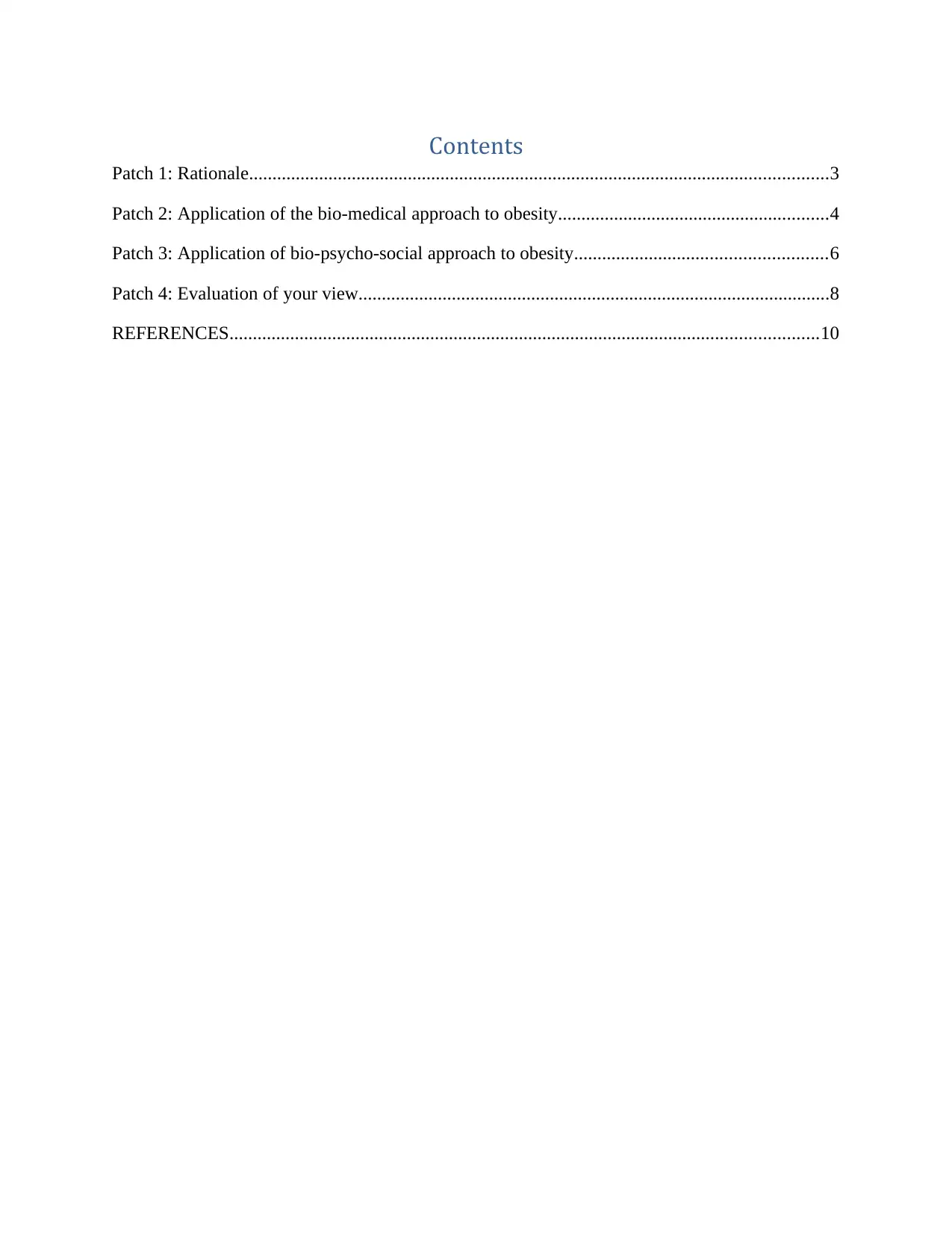
Contents
Patch 1: Rationale............................................................................................................................3
Patch 2: Application of the bio-medical approach to obesity..........................................................4
Patch 3: Application of bio-psycho-social approach to obesity......................................................6
Patch 4: Evaluation of your view.....................................................................................................8
REFERENCES..............................................................................................................................10
Patch 1: Rationale............................................................................................................................3
Patch 2: Application of the bio-medical approach to obesity..........................................................4
Patch 3: Application of bio-psycho-social approach to obesity......................................................6
Patch 4: Evaluation of your view.....................................................................................................8
REFERENCES..............................................................................................................................10
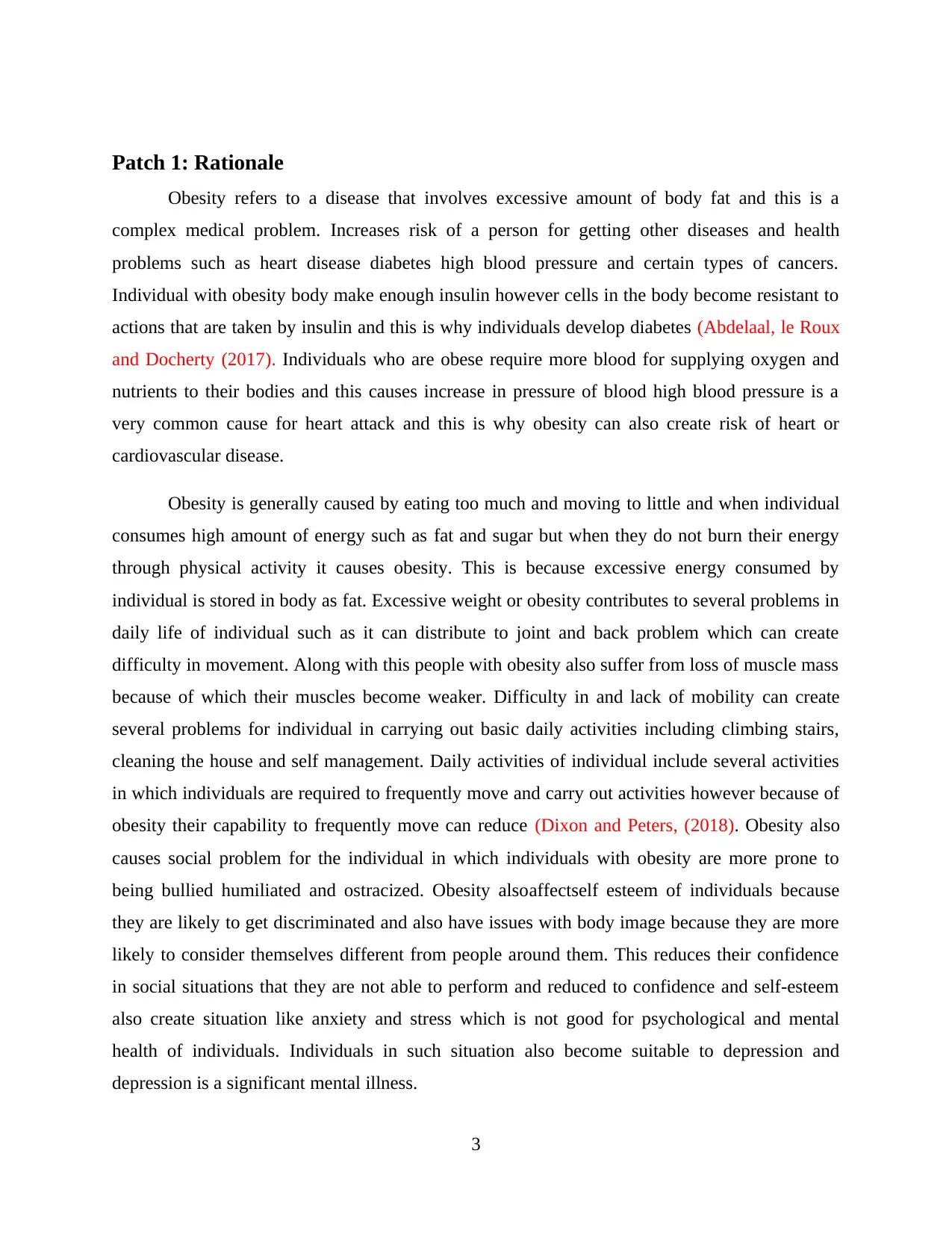
Patch 1: Rationale
Obesity refers to a disease that involves excessive amount of body fat and this is a
complex medical problem. Increases risk of a person for getting other diseases and health
problems such as heart disease diabetes high blood pressure and certain types of cancers.
Individual with obesity body make enough insulin however cells in the body become resistant to
actions that are taken by insulin and this is why individuals develop diabetes (Abdelaal, le Roux
and Docherty (2017). Individuals who are obese require more blood for supplying oxygen and
nutrients to their bodies and this causes increase in pressure of blood high blood pressure is a
very common cause for heart attack and this is why obesity can also create risk of heart or
cardiovascular disease.
Obesity is generally caused by eating too much and moving to little and when individual
consumes high amount of energy such as fat and sugar but when they do not burn their energy
through physical activity it causes obesity. This is because excessive energy consumed by
individual is stored in body as fat. Excessive weight or obesity contributes to several problems in
daily life of individual such as it can distribute to joint and back problem which can create
difficulty in movement. Along with this people with obesity also suffer from loss of muscle mass
because of which their muscles become weaker. Difficulty in and lack of mobility can create
several problems for individual in carrying out basic daily activities including climbing stairs,
cleaning the house and self management. Daily activities of individual include several activities
in which individuals are required to frequently move and carry out activities however because of
obesity their capability to frequently move can reduce (Dixon and Peters, (2018). Obesity also
causes social problem for the individual in which individuals with obesity are more prone to
being bullied humiliated and ostracized. Obesity alsoaffectself esteem of individuals because
they are likely to get discriminated and also have issues with body image because they are more
likely to consider themselves different from people around them. This reduces their confidence
in social situations that they are not able to perform and reduced to confidence and self-esteem
also create situation like anxiety and stress which is not good for psychological and mental
health of individuals. Individuals in such situation also become suitable to depression and
depression is a significant mental illness.
3
Obesity refers to a disease that involves excessive amount of body fat and this is a
complex medical problem. Increases risk of a person for getting other diseases and health
problems such as heart disease diabetes high blood pressure and certain types of cancers.
Individual with obesity body make enough insulin however cells in the body become resistant to
actions that are taken by insulin and this is why individuals develop diabetes (Abdelaal, le Roux
and Docherty (2017). Individuals who are obese require more blood for supplying oxygen and
nutrients to their bodies and this causes increase in pressure of blood high blood pressure is a
very common cause for heart attack and this is why obesity can also create risk of heart or
cardiovascular disease.
Obesity is generally caused by eating too much and moving to little and when individual
consumes high amount of energy such as fat and sugar but when they do not burn their energy
through physical activity it causes obesity. This is because excessive energy consumed by
individual is stored in body as fat. Excessive weight or obesity contributes to several problems in
daily life of individual such as it can distribute to joint and back problem which can create
difficulty in movement. Along with this people with obesity also suffer from loss of muscle mass
because of which their muscles become weaker. Difficulty in and lack of mobility can create
several problems for individual in carrying out basic daily activities including climbing stairs,
cleaning the house and self management. Daily activities of individual include several activities
in which individuals are required to frequently move and carry out activities however because of
obesity their capability to frequently move can reduce (Dixon and Peters, (2018). Obesity also
causes social problem for the individual in which individuals with obesity are more prone to
being bullied humiliated and ostracized. Obesity alsoaffectself esteem of individuals because
they are likely to get discriminated and also have issues with body image because they are more
likely to consider themselves different from people around them. This reduces their confidence
in social situations that they are not able to perform and reduced to confidence and self-esteem
also create situation like anxiety and stress which is not good for psychological and mental
health of individuals. Individuals in such situation also become suitable to depression and
depression is a significant mental illness.
3
⊘ This is a preview!⊘
Do you want full access?
Subscribe today to unlock all pages.

Trusted by 1+ million students worldwide
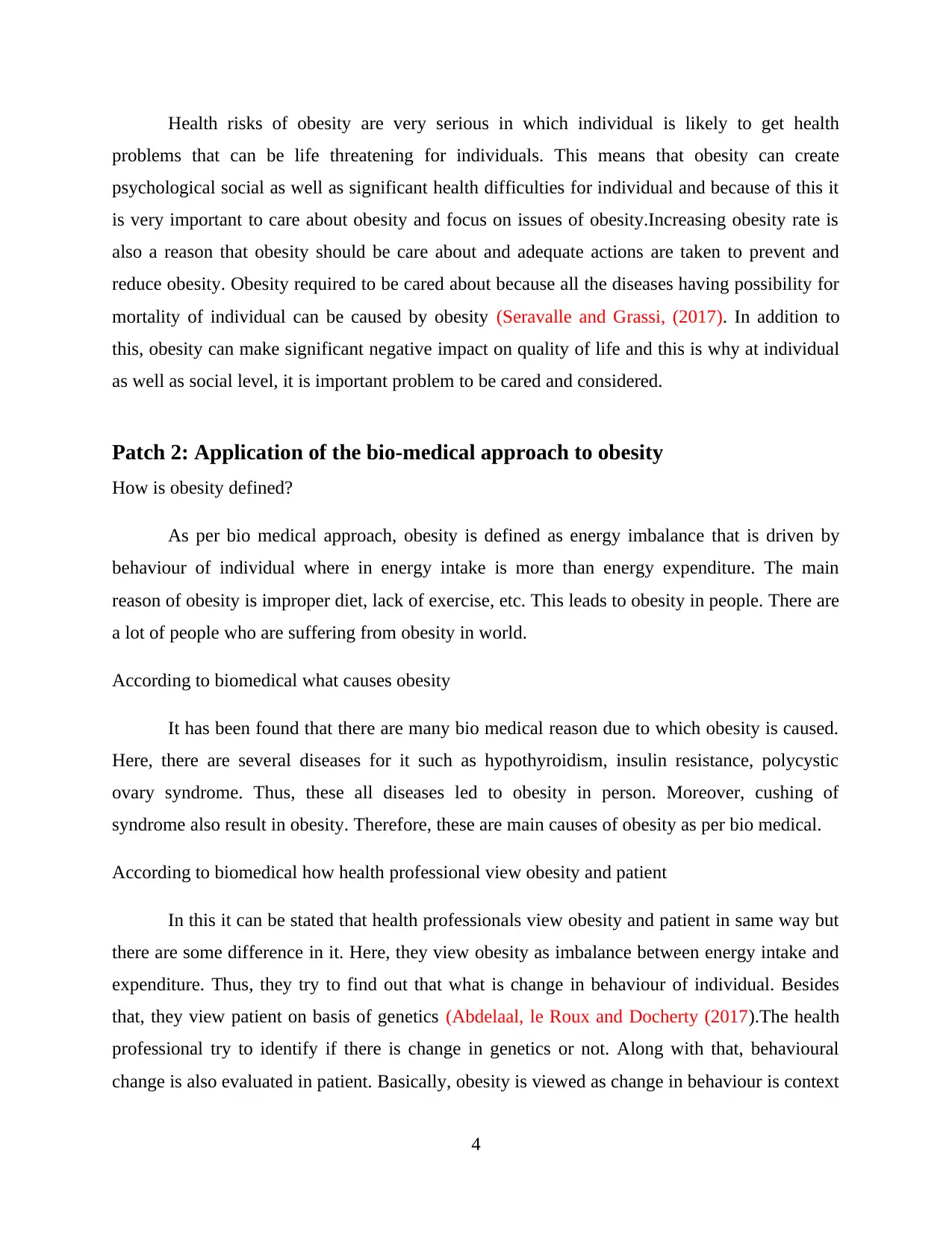
Health risks of obesity are very serious in which individual is likely to get health
problems that can be life threatening for individuals. This means that obesity can create
psychological social as well as significant health difficulties for individual and because of this it
is very important to care about obesity and focus on issues of obesity.Increasing obesity rate is
also a reason that obesity should be care about and adequate actions are taken to prevent and
reduce obesity. Obesity required to be cared about because all the diseases having possibility for
mortality of individual can be caused by obesity (Seravalle and Grassi, (2017). In addition to
this, obesity can make significant negative impact on quality of life and this is why at individual
as well as social level, it is important problem to be cared and considered.
Patch 2: Application of the bio-medical approach to obesity
How is obesity defined?
As per bio medical approach, obesity is defined as energy imbalance that is driven by
behaviour of individual where in energy intake is more than energy expenditure. The main
reason of obesity is improper diet, lack of exercise, etc. This leads to obesity in people. There are
a lot of people who are suffering from obesity in world.
According to biomedical what causes obesity
It has been found that there are many bio medical reason due to which obesity is caused.
Here, there are several diseases for it such as hypothyroidism, insulin resistance, polycystic
ovary syndrome. Thus, these all diseases led to obesity in person. Moreover, cushing of
syndrome also result in obesity. Therefore, these are main causes of obesity as per bio medical.
According to biomedical how health professional view obesity and patient
In this it can be stated that health professionals view obesity and patient in same way but
there are some difference in it. Here, they view obesity as imbalance between energy intake and
expenditure. Thus, they try to find out that what is change in behaviour of individual. Besides
that, they view patient on basis of genetics (Abdelaal, le Roux and Docherty (2017).The health
professional try to identify if there is change in genetics or not. Along with that, behavioural
change is also evaluated in patient. Basically, obesity is viewed as change in behaviour is context
4
problems that can be life threatening for individuals. This means that obesity can create
psychological social as well as significant health difficulties for individual and because of this it
is very important to care about obesity and focus on issues of obesity.Increasing obesity rate is
also a reason that obesity should be care about and adequate actions are taken to prevent and
reduce obesity. Obesity required to be cared about because all the diseases having possibility for
mortality of individual can be caused by obesity (Seravalle and Grassi, (2017). In addition to
this, obesity can make significant negative impact on quality of life and this is why at individual
as well as social level, it is important problem to be cared and considered.
Patch 2: Application of the bio-medical approach to obesity
How is obesity defined?
As per bio medical approach, obesity is defined as energy imbalance that is driven by
behaviour of individual where in energy intake is more than energy expenditure. The main
reason of obesity is improper diet, lack of exercise, etc. This leads to obesity in people. There are
a lot of people who are suffering from obesity in world.
According to biomedical what causes obesity
It has been found that there are many bio medical reason due to which obesity is caused.
Here, there are several diseases for it such as hypothyroidism, insulin resistance, polycystic
ovary syndrome. Thus, these all diseases led to obesity in person. Moreover, cushing of
syndrome also result in obesity. Therefore, these are main causes of obesity as per bio medical.
According to biomedical how health professional view obesity and patient
In this it can be stated that health professionals view obesity and patient in same way but
there are some difference in it. Here, they view obesity as imbalance between energy intake and
expenditure. Thus, they try to find out that what is change in behaviour of individual. Besides
that, they view patient on basis of genetics (Abdelaal, le Roux and Docherty (2017).The health
professional try to identify if there is change in genetics or not. Along with that, behavioural
change is also evaluated in patient. Basically, obesity is viewed as change in behaviour is context
4
Paraphrase This Document
Need a fresh take? Get an instant paraphrase of this document with our AI Paraphraser
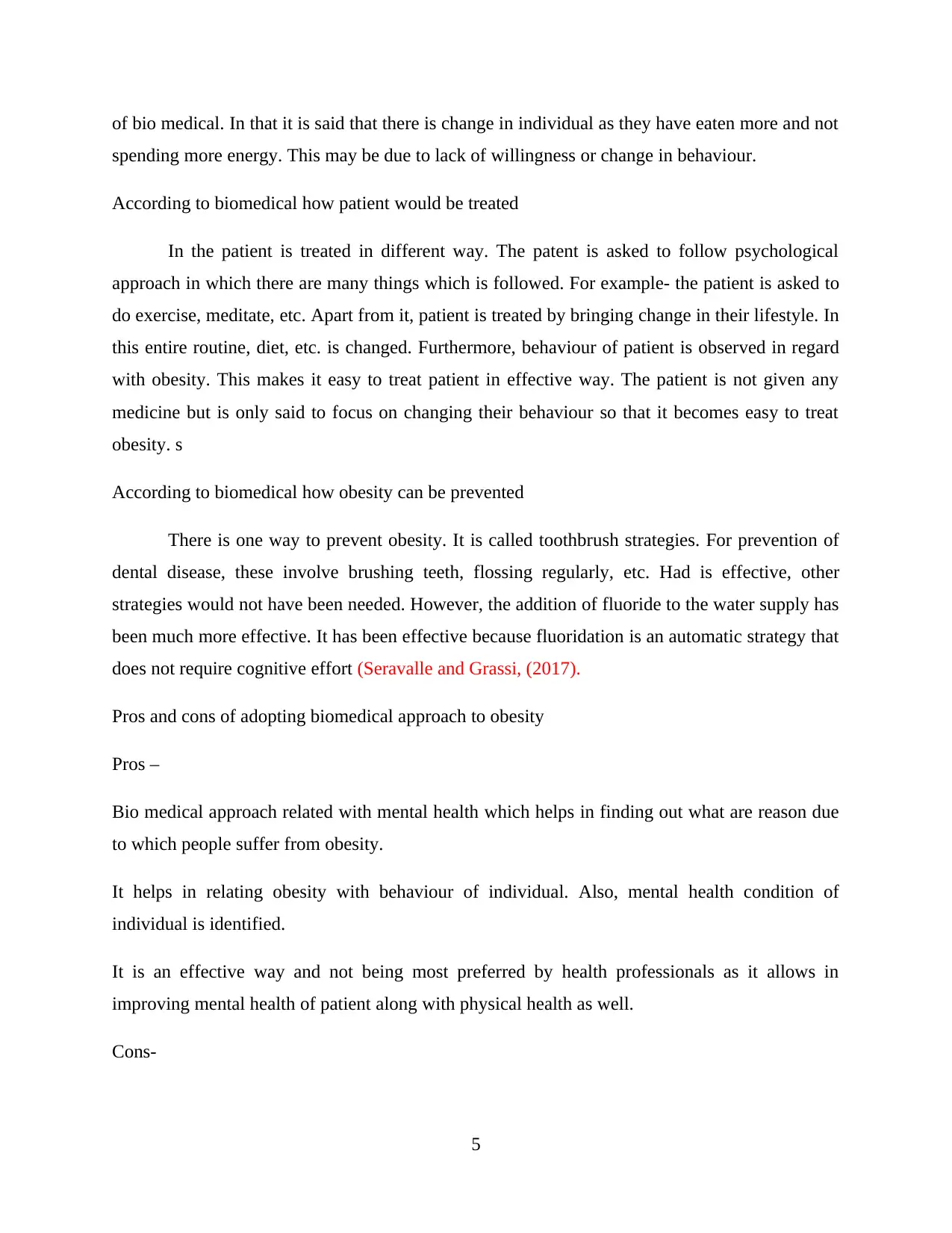
of bio medical. In that it is said that there is change in individual as they have eaten more and not
spending more energy. This may be due to lack of willingness or change in behaviour.
According to biomedical how patient would be treated
In the patient is treated in different way. The patent is asked to follow psychological
approach in which there are many things which is followed. For example- the patient is asked to
do exercise, meditate, etc. Apart from it, patient is treated by bringing change in their lifestyle. In
this entire routine, diet, etc. is changed. Furthermore, behaviour of patient is observed in regard
with obesity. This makes it easy to treat patient in effective way. The patient is not given any
medicine but is only said to focus on changing their behaviour so that it becomes easy to treat
obesity. s
According to biomedical how obesity can be prevented
There is one way to prevent obesity. It is called toothbrush strategies. For prevention of
dental disease, these involve brushing teeth, flossing regularly, etc. Had is effective, other
strategies would not have been needed. However, the addition of fluoride to the water supply has
been much more effective. It has been effective because fluoridation is an automatic strategy that
does not require cognitive effort (Seravalle and Grassi, (2017).
Pros and cons of adopting biomedical approach to obesity
Pros –
Bio medical approach related with mental health which helps in finding out what are reason due
to which people suffer from obesity.
It helps in relating obesity with behaviour of individual. Also, mental health condition of
individual is identified.
It is an effective way and not being most preferred by health professionals as it allows in
improving mental health of patient along with physical health as well.
Cons-
5
spending more energy. This may be due to lack of willingness or change in behaviour.
According to biomedical how patient would be treated
In the patient is treated in different way. The patent is asked to follow psychological
approach in which there are many things which is followed. For example- the patient is asked to
do exercise, meditate, etc. Apart from it, patient is treated by bringing change in their lifestyle. In
this entire routine, diet, etc. is changed. Furthermore, behaviour of patient is observed in regard
with obesity. This makes it easy to treat patient in effective way. The patient is not given any
medicine but is only said to focus on changing their behaviour so that it becomes easy to treat
obesity. s
According to biomedical how obesity can be prevented
There is one way to prevent obesity. It is called toothbrush strategies. For prevention of
dental disease, these involve brushing teeth, flossing regularly, etc. Had is effective, other
strategies would not have been needed. However, the addition of fluoride to the water supply has
been much more effective. It has been effective because fluoridation is an automatic strategy that
does not require cognitive effort (Seravalle and Grassi, (2017).
Pros and cons of adopting biomedical approach to obesity
Pros –
Bio medical approach related with mental health which helps in finding out what are reason due
to which people suffer from obesity.
It helps in relating obesity with behaviour of individual. Also, mental health condition of
individual is identified.
It is an effective way and not being most preferred by health professionals as it allows in
improving mental health of patient along with physical health as well.
Cons-
5
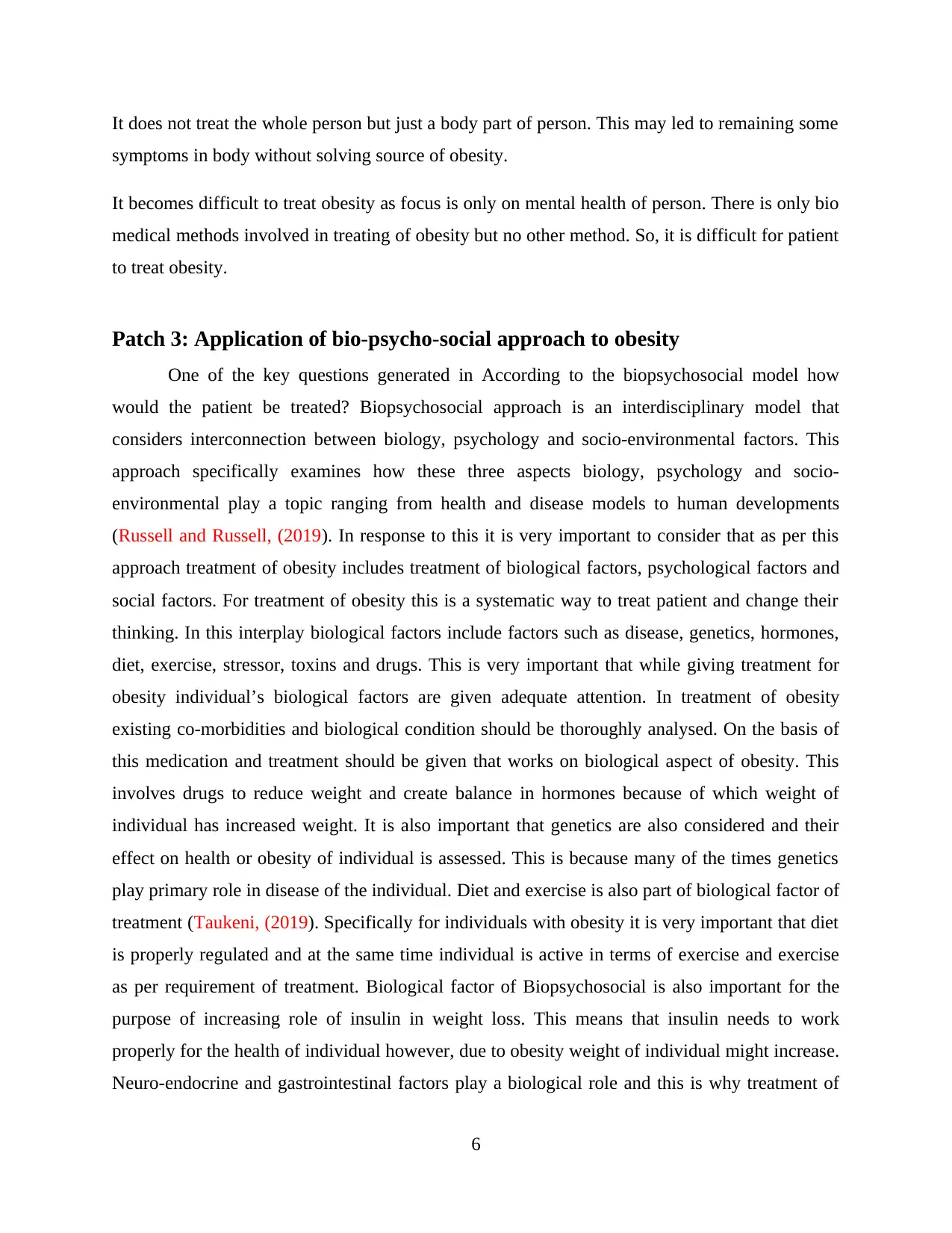
It does not treat the whole person but just a body part of person. This may led to remaining some
symptoms in body without solving source of obesity.
It becomes difficult to treat obesity as focus is only on mental health of person. There is only bio
medical methods involved in treating of obesity but no other method. So, it is difficult for patient
to treat obesity.
Patch 3: Application of bio-psycho-social approach to obesity
One of the key questions generated in According to the biopsychosocial model how
would the patient be treated? Biopsychosocial approach is an interdisciplinary model that
considers interconnection between biology, psychology and socio-environmental factors. This
approach specifically examines how these three aspects biology, psychology and socio-
environmental play a topic ranging from health and disease models to human developments
(Russell and Russell, (2019). In response to this it is very important to consider that as per this
approach treatment of obesity includes treatment of biological factors, psychological factors and
social factors. For treatment of obesity this is a systematic way to treat patient and change their
thinking. In this interplay biological factors include factors such as disease, genetics, hormones,
diet, exercise, stressor, toxins and drugs. This is very important that while giving treatment for
obesity individual’s biological factors are given adequate attention. In treatment of obesity
existing co-morbidities and biological condition should be thoroughly analysed. On the basis of
this medication and treatment should be given that works on biological aspect of obesity. This
involves drugs to reduce weight and create balance in hormones because of which weight of
individual has increased weight. It is also important that genetics are also considered and their
effect on health or obesity of individual is assessed. This is because many of the times genetics
play primary role in disease of the individual. Diet and exercise is also part of biological factor of
treatment (Taukeni, (2019). Specifically for individuals with obesity it is very important that diet
is properly regulated and at the same time individual is active in terms of exercise and exercise
as per requirement of treatment. Biological factor of Biopsychosocial is also important for the
purpose of increasing role of insulin in weight loss. This means that insulin needs to work
properly for the health of individual however, due to obesity weight of individual might increase.
Neuro-endocrine and gastrointestinal factors play a biological role and this is why treatment of
6
symptoms in body without solving source of obesity.
It becomes difficult to treat obesity as focus is only on mental health of person. There is only bio
medical methods involved in treating of obesity but no other method. So, it is difficult for patient
to treat obesity.
Patch 3: Application of bio-psycho-social approach to obesity
One of the key questions generated in According to the biopsychosocial model how
would the patient be treated? Biopsychosocial approach is an interdisciplinary model that
considers interconnection between biology, psychology and socio-environmental factors. This
approach specifically examines how these three aspects biology, psychology and socio-
environmental play a topic ranging from health and disease models to human developments
(Russell and Russell, (2019). In response to this it is very important to consider that as per this
approach treatment of obesity includes treatment of biological factors, psychological factors and
social factors. For treatment of obesity this is a systematic way to treat patient and change their
thinking. In this interplay biological factors include factors such as disease, genetics, hormones,
diet, exercise, stressor, toxins and drugs. This is very important that while giving treatment for
obesity individual’s biological factors are given adequate attention. In treatment of obesity
existing co-morbidities and biological condition should be thoroughly analysed. On the basis of
this medication and treatment should be given that works on biological aspect of obesity. This
involves drugs to reduce weight and create balance in hormones because of which weight of
individual has increased weight. It is also important that genetics are also considered and their
effect on health or obesity of individual is assessed. This is because many of the times genetics
play primary role in disease of the individual. Diet and exercise is also part of biological factor of
treatment (Taukeni, (2019). Specifically for individuals with obesity it is very important that diet
is properly regulated and at the same time individual is active in terms of exercise and exercise
as per requirement of treatment. Biological factor of Biopsychosocial is also important for the
purpose of increasing role of insulin in weight loss. This means that insulin needs to work
properly for the health of individual however, due to obesity weight of individual might increase.
Neuro-endocrine and gastrointestinal factors play a biological role and this is why treatment of
6
⊘ This is a preview!⊘
Do you want full access?
Subscribe today to unlock all pages.

Trusted by 1+ million students worldwide
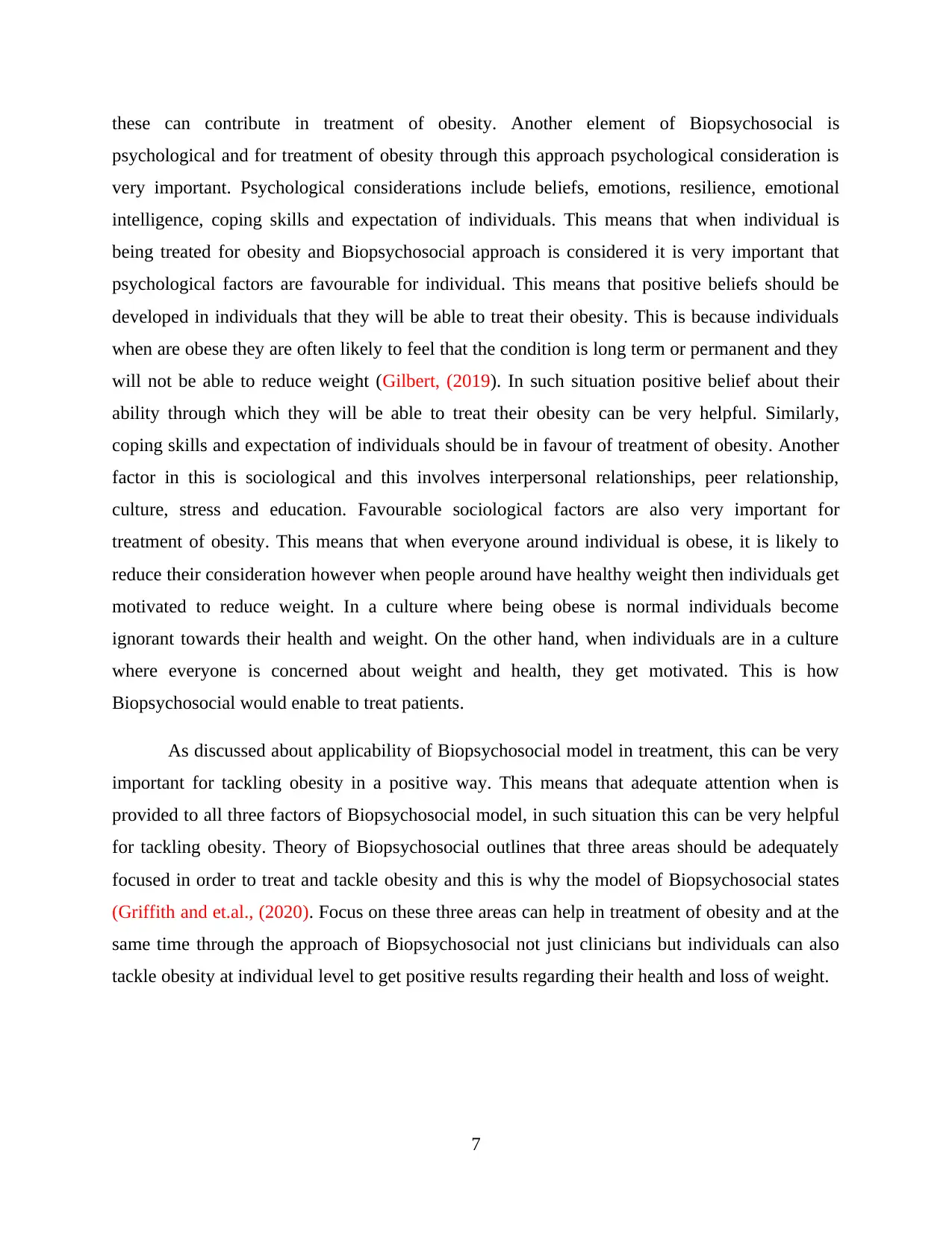
these can contribute in treatment of obesity. Another element of Biopsychosocial is
psychological and for treatment of obesity through this approach psychological consideration is
very important. Psychological considerations include beliefs, emotions, resilience, emotional
intelligence, coping skills and expectation of individuals. This means that when individual is
being treated for obesity and Biopsychosocial approach is considered it is very important that
psychological factors are favourable for individual. This means that positive beliefs should be
developed in individuals that they will be able to treat their obesity. This is because individuals
when are obese they are often likely to feel that the condition is long term or permanent and they
will not be able to reduce weight (Gilbert, (2019). In such situation positive belief about their
ability through which they will be able to treat their obesity can be very helpful. Similarly,
coping skills and expectation of individuals should be in favour of treatment of obesity. Another
factor in this is sociological and this involves interpersonal relationships, peer relationship,
culture, stress and education. Favourable sociological factors are also very important for
treatment of obesity. This means that when everyone around individual is obese, it is likely to
reduce their consideration however when people around have healthy weight then individuals get
motivated to reduce weight. In a culture where being obese is normal individuals become
ignorant towards their health and weight. On the other hand, when individuals are in a culture
where everyone is concerned about weight and health, they get motivated. This is how
Biopsychosocial would enable to treat patients.
As discussed about applicability of Biopsychosocial model in treatment, this can be very
important for tackling obesity in a positive way. This means that adequate attention when is
provided to all three factors of Biopsychosocial model, in such situation this can be very helpful
for tackling obesity. Theory of Biopsychosocial outlines that three areas should be adequately
focused in order to treat and tackle obesity and this is why the model of Biopsychosocial states
(Griffith and et.al., (2020). Focus on these three areas can help in treatment of obesity and at the
same time through the approach of Biopsychosocial not just clinicians but individuals can also
tackle obesity at individual level to get positive results regarding their health and loss of weight.
7
psychological and for treatment of obesity through this approach psychological consideration is
very important. Psychological considerations include beliefs, emotions, resilience, emotional
intelligence, coping skills and expectation of individuals. This means that when individual is
being treated for obesity and Biopsychosocial approach is considered it is very important that
psychological factors are favourable for individual. This means that positive beliefs should be
developed in individuals that they will be able to treat their obesity. This is because individuals
when are obese they are often likely to feel that the condition is long term or permanent and they
will not be able to reduce weight (Gilbert, (2019). In such situation positive belief about their
ability through which they will be able to treat their obesity can be very helpful. Similarly,
coping skills and expectation of individuals should be in favour of treatment of obesity. Another
factor in this is sociological and this involves interpersonal relationships, peer relationship,
culture, stress and education. Favourable sociological factors are also very important for
treatment of obesity. This means that when everyone around individual is obese, it is likely to
reduce their consideration however when people around have healthy weight then individuals get
motivated to reduce weight. In a culture where being obese is normal individuals become
ignorant towards their health and weight. On the other hand, when individuals are in a culture
where everyone is concerned about weight and health, they get motivated. This is how
Biopsychosocial would enable to treat patients.
As discussed about applicability of Biopsychosocial model in treatment, this can be very
important for tackling obesity in a positive way. This means that adequate attention when is
provided to all three factors of Biopsychosocial model, in such situation this can be very helpful
for tackling obesity. Theory of Biopsychosocial outlines that three areas should be adequately
focused in order to treat and tackle obesity and this is why the model of Biopsychosocial states
(Griffith and et.al., (2020). Focus on these three areas can help in treatment of obesity and at the
same time through the approach of Biopsychosocial not just clinicians but individuals can also
tackle obesity at individual level to get positive results regarding their health and loss of weight.
7
Paraphrase This Document
Need a fresh take? Get an instant paraphrase of this document with our AI Paraphraser
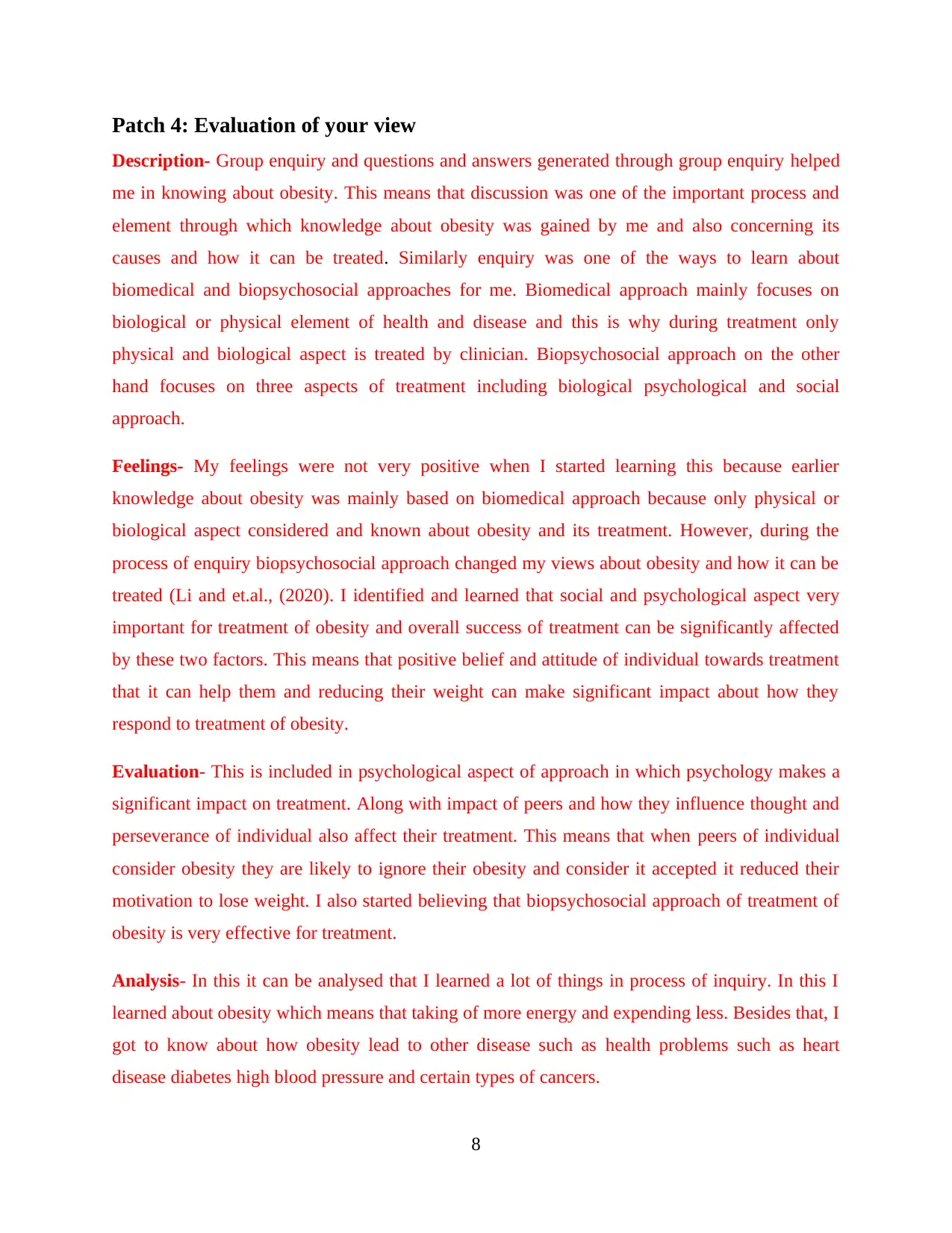
Patch 4: Evaluation of your view
Description- Group enquiry and questions and answers generated through group enquiry helped
me in knowing about obesity. This means that discussion was one of the important process and
element through which knowledge about obesity was gained by me and also concerning its
causes and how it can be treated. Similarly enquiry was one of the ways to learn about
biomedical and biopsychosocial approaches for me. Biomedical approach mainly focuses on
biological or physical element of health and disease and this is why during treatment only
physical and biological aspect is treated by clinician. Biopsychosocial approach on the other
hand focuses on three aspects of treatment including biological psychological and social
approach.
Feelings- My feelings were not very positive when I started learning this because earlier
knowledge about obesity was mainly based on biomedical approach because only physical or
biological aspect considered and known about obesity and its treatment. However, during the
process of enquiry biopsychosocial approach changed my views about obesity and how it can be
treated (Li and et.al., (2020). I identified and learned that social and psychological aspect very
important for treatment of obesity and overall success of treatment can be significantly affected
by these two factors. This means that positive belief and attitude of individual towards treatment
that it can help them and reducing their weight can make significant impact about how they
respond to treatment of obesity.
Evaluation- This is included in psychological aspect of approach in which psychology makes a
significant impact on treatment. Along with impact of peers and how they influence thought and
perseverance of individual also affect their treatment. This means that when peers of individual
consider obesity they are likely to ignore their obesity and consider it accepted it reduced their
motivation to lose weight. I also started believing that biopsychosocial approach of treatment of
obesity is very effective for treatment.
Analysis- In this it can be analysed that I learned a lot of things in process of inquiry. In this I
learned about obesity which means that taking of more energy and expending less. Besides that, I
got to know about how obesity lead to other disease such as health problems such as heart
disease diabetes high blood pressure and certain types of cancers.
8
Description- Group enquiry and questions and answers generated through group enquiry helped
me in knowing about obesity. This means that discussion was one of the important process and
element through which knowledge about obesity was gained by me and also concerning its
causes and how it can be treated. Similarly enquiry was one of the ways to learn about
biomedical and biopsychosocial approaches for me. Biomedical approach mainly focuses on
biological or physical element of health and disease and this is why during treatment only
physical and biological aspect is treated by clinician. Biopsychosocial approach on the other
hand focuses on three aspects of treatment including biological psychological and social
approach.
Feelings- My feelings were not very positive when I started learning this because earlier
knowledge about obesity was mainly based on biomedical approach because only physical or
biological aspect considered and known about obesity and its treatment. However, during the
process of enquiry biopsychosocial approach changed my views about obesity and how it can be
treated (Li and et.al., (2020). I identified and learned that social and psychological aspect very
important for treatment of obesity and overall success of treatment can be significantly affected
by these two factors. This means that positive belief and attitude of individual towards treatment
that it can help them and reducing their weight can make significant impact about how they
respond to treatment of obesity.
Evaluation- This is included in psychological aspect of approach in which psychology makes a
significant impact on treatment. Along with impact of peers and how they influence thought and
perseverance of individual also affect their treatment. This means that when peers of individual
consider obesity they are likely to ignore their obesity and consider it accepted it reduced their
motivation to lose weight. I also started believing that biopsychosocial approach of treatment of
obesity is very effective for treatment.
Analysis- In this it can be analysed that I learned a lot of things in process of inquiry. In this I
learned about obesity which means that taking of more energy and expending less. Besides that, I
got to know about how obesity lead to other disease such as health problems such as heart
disease diabetes high blood pressure and certain types of cancers.
8

Conclusion- In addition to it, I gained knowledge about bio psycho social approach to obesity. in
that I analysed that what is obesity in context of psycho social approach. I summarised that
obesity can be treated with help of exercise, yoga, maintaining healthy and proper diet, etc. the
health professional and both bio medical and socio psycho social approach view obesity as
change in behaviour of people where they eat more (He, Parkinson and Doyle, (2018). In this
mental health also plays crucial role as it influences person not to eat more and maintain well
being. Besides that, it also changes behaviour and attitude of patient in treating obesity.
Action plan- I decided that I need to gain more knowledge about biopsychosocial approach is an
interdisciplinary model that considers interconnection between biology, psychology and socio
environmental factors. I also need to biomedical approach mainly focuses on biological or
physical element of health and disease and this is why during treatment only physical and
biological aspect is treated by clinician. I need to gain knowledge obesity also affectself esteem
of individuals because they are likely to get discriminated and also have issues with body image
because they are more likely to consider themselves different from people around them.
9
that I analysed that what is obesity in context of psycho social approach. I summarised that
obesity can be treated with help of exercise, yoga, maintaining healthy and proper diet, etc. the
health professional and both bio medical and socio psycho social approach view obesity as
change in behaviour of people where they eat more (He, Parkinson and Doyle, (2018). In this
mental health also plays crucial role as it influences person not to eat more and maintain well
being. Besides that, it also changes behaviour and attitude of patient in treating obesity.
Action plan- I decided that I need to gain more knowledge about biopsychosocial approach is an
interdisciplinary model that considers interconnection between biology, psychology and socio
environmental factors. I also need to biomedical approach mainly focuses on biological or
physical element of health and disease and this is why during treatment only physical and
biological aspect is treated by clinician. I need to gain knowledge obesity also affectself esteem
of individuals because they are likely to get discriminated and also have issues with body image
because they are more likely to consider themselves different from people around them.
9
⊘ This is a preview!⊘
Do you want full access?
Subscribe today to unlock all pages.

Trusted by 1+ million students worldwide
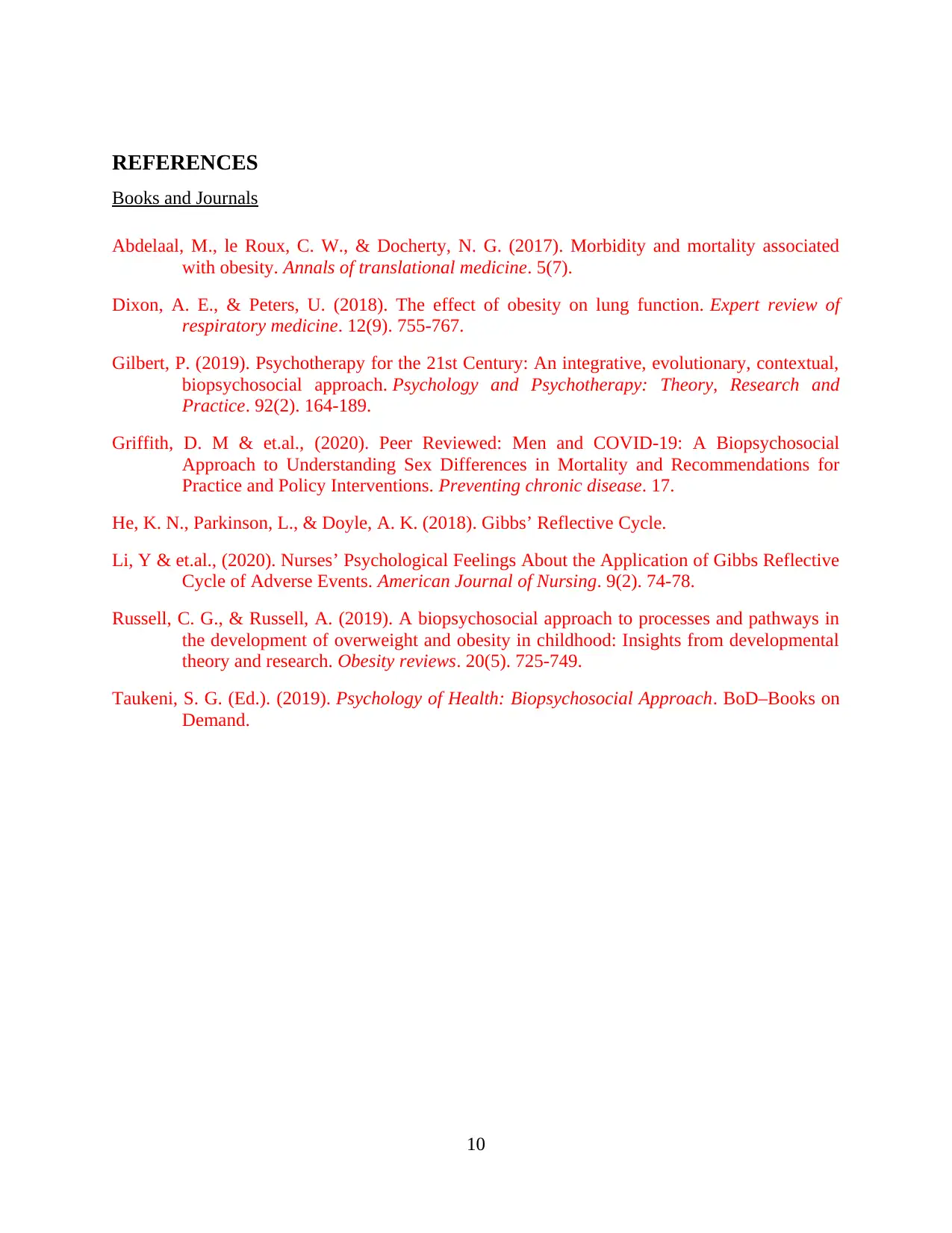
REFERENCES
Books and Journals
Abdelaal, M., le Roux, C. W., & Docherty, N. G. (2017). Morbidity and mortality associated
with obesity. Annals of translational medicine. 5(7).
Dixon, A. E., & Peters, U. (2018). The effect of obesity on lung function. Expert review of
respiratory medicine. 12(9). 755-767.
Gilbert, P. (2019). Psychotherapy for the 21st Century: An integrative, evolutionary, contextual,
biopsychosocial approach. Psychology and Psychotherapy: Theory, Research and
Practice. 92(2). 164-189.
Griffith, D. M & et.al., (2020). Peer Reviewed: Men and COVID-19: A Biopsychosocial
Approach to Understanding Sex Differences in Mortality and Recommendations for
Practice and Policy Interventions. Preventing chronic disease. 17.
He, K. N., Parkinson, L., & Doyle, A. K. (2018). Gibbs’ Reflective Cycle.
Li, Y & et.al., (2020). Nurses’ Psychological Feelings About the Application of Gibbs Reflective
Cycle of Adverse Events. American Journal of Nursing. 9(2). 74-78.
Russell, C. G., & Russell, A. (2019). A biopsychosocial approach to processes and pathways in
the development of overweight and obesity in childhood: Insights from developmental
theory and research. Obesity reviews. 20(5). 725-749.
Taukeni, S. G. (Ed.). (2019). Psychology of Health: Biopsychosocial Approach. BoD–Books on
Demand.
10
Books and Journals
Abdelaal, M., le Roux, C. W., & Docherty, N. G. (2017). Morbidity and mortality associated
with obesity. Annals of translational medicine. 5(7).
Dixon, A. E., & Peters, U. (2018). The effect of obesity on lung function. Expert review of
respiratory medicine. 12(9). 755-767.
Gilbert, P. (2019). Psychotherapy for the 21st Century: An integrative, evolutionary, contextual,
biopsychosocial approach. Psychology and Psychotherapy: Theory, Research and
Practice. 92(2). 164-189.
Griffith, D. M & et.al., (2020). Peer Reviewed: Men and COVID-19: A Biopsychosocial
Approach to Understanding Sex Differences in Mortality and Recommendations for
Practice and Policy Interventions. Preventing chronic disease. 17.
He, K. N., Parkinson, L., & Doyle, A. K. (2018). Gibbs’ Reflective Cycle.
Li, Y & et.al., (2020). Nurses’ Psychological Feelings About the Application of Gibbs Reflective
Cycle of Adverse Events. American Journal of Nursing. 9(2). 74-78.
Russell, C. G., & Russell, A. (2019). A biopsychosocial approach to processes and pathways in
the development of overweight and obesity in childhood: Insights from developmental
theory and research. Obesity reviews. 20(5). 725-749.
Taukeni, S. G. (Ed.). (2019). Psychology of Health: Biopsychosocial Approach. BoD–Books on
Demand.
10
Paraphrase This Document
Need a fresh take? Get an instant paraphrase of this document with our AI Paraphraser

11
1 out of 11
Related Documents
Your All-in-One AI-Powered Toolkit for Academic Success.
+13062052269
info@desklib.com
Available 24*7 on WhatsApp / Email
![[object Object]](/_next/static/media/star-bottom.7253800d.svg)
Unlock your academic potential
Copyright © 2020–2026 A2Z Services. All Rights Reserved. Developed and managed by ZUCOL.





